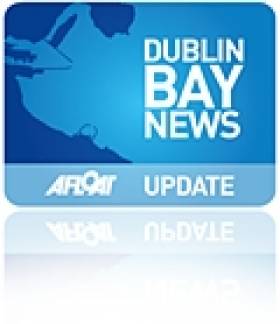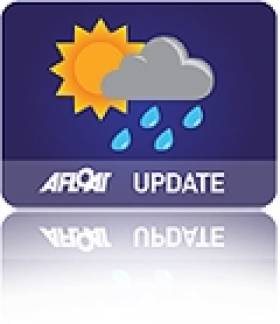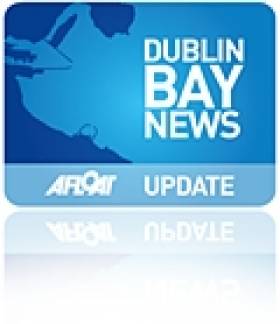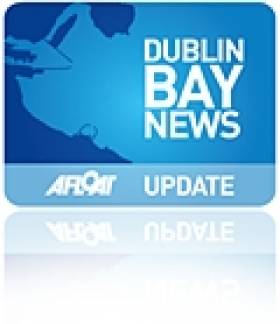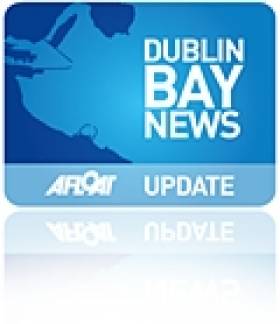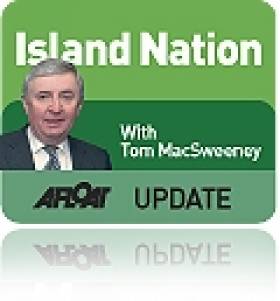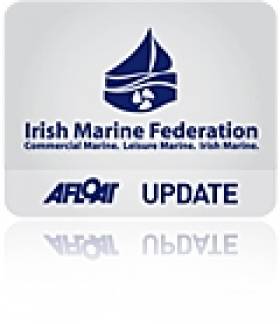Displaying items by tag: leisure
Coal Harbour Users Group (CHUG) Seek Public Marine Leisure Centre at Dun Laoghaire Harbour
#chug – The Coal Harbour Users Group (CHUG) is a group that represents the interests of leisure users of the Dun Laoghaire Harbour & Boatyard, and also the interests of the public that use the resource. Consistent with this, CHUG wish to promote marine related leisure and sport activity for the "ordinary person" in the Dun Laoghaire area and in Dublin Bay. During April 2015, CHUG made a submission to the Dun Laoghaire Cruise Stakeholder Group relating to the proposed new ships berth within the harbour. Part of the submission suggested development of a Marine Leisure Centre in the area west of the West Pier, and suggested that some of the spoil that would result from proposed harbour dredging be used to reclaim and extend land there to accommodate the development.
Kevin Woods writes that CHUG members have viewed the DLR Draft County Development Plan 2016-2022. In the context of the plan, CHUG make the following comments and requests:
CHUG request that the area immediately west of the West Pier including the area known as "The Gut" be designated for marine pleasure, leisure, sport and education use. The development would principally include:
A public marine leisure centre operated along the lines of a municipal leisure centre. This is detailed below.
A new public slip suitable for use by small boats at all tides. There are few public slipways in the Dublin area, and of those, some are not usable at low tide. An additional slip would improve public accessibility to the water and to Dublin Bay in general.
Additional space for marine leisure use, including for storage and repair of small boats and equipment. This might be provided by land reclamation in the area shaded and marked (1) on the attached map.
While the above development appears to be in line with existing Draft Development Plan SLO 14 and SLO 95, these might be reviewed and revised as appropriate should this be necessary to carry out the above. This might be assisted by introduction a new SLO relating to the area marked (1) west of the West Pier along the lines of the following:
Objective to promote water related leisure, sport, education, training facilities for public use at the coastal fringe in the area know as The Gut to the west of the West Pier that may include the reclamation of land and also the development of a new breakwater projecting westward from the pier side. This proposal would be subject to a feasibility study, including an assessment of any options, access considerations and impact on adjoining users. The feasibility study would include appropriate environmental assessments including any required under the Habitats Directive in co-operation with the relevant agencies.
A Marine Activity Centre might include:
Club facilities - offices, store rooms.
Shared meeting room, training / education room, changing room / showers / WCs.
Drying room for wetsuits,
Diving equipment store room
Compressor room for filling diving cylinders.
Small boat repair workshop
Shelters for persons, equipment
Hardstanding for secure dinghy & rib parking, canoe / kayak, windsurf and paddle board storage, small craft trailer storage.
Car, coach / minibus parking.
The centre might also cater for:
Fishing, birdwatching, and nature related activity, and might be a base from which the following would be organised:
Training in water safety
Transition year and primary schools activities
Beach and marine nature, ecology, and environmental study activity.
Marine related art
Youth club facilities
A new scout den
A marine interpretive centre / marine history and heritage centre
Public Urged To Be Aware of Water Risks as Temperatures Soar
#Weather - Irish Water Safety has urged anyone heading to the water on lakes, rivers or beaches during this week's heatwave to take extra precautions as Met Éireann issues a 'yellow warning' amid soaring temperatures.
Speaking to TheJournal.ie, IWS chief John Leach underlined the increased risk of drownings during warmer periods, especially among young people in their teens or early twenties to go swimming in unsupervised areas.
Only today RTÉ News is reporting on the death of a 21-year-old Lisa Knight, who drowned while swimming with friends on the River Feale in Co Limerick in the early hours of this morning.
The heatwave, which is expected to peak on Friday with temperatures in many parts breaking the 30s, has drawn people to coastal areas in droves.
Also on TheJournal.ie, the Irish Coast Guard has reported a 40% increase in call-outs relating to watersport and other leisure activities over the last three weeks compared to the same period in 2012.
A significant number of these relate to rogue jetskiers "tormenting" beach-goers by racing through designated swimming areas on their personal water craft, according to IRCG operations manager Declan Geoghehan.
In related news, the Irish Independent says hoax calls to the coastguard have increased 40-fold since the IRCG was added to the main emergency services accessible by dialling 999 or 112 - and now constitute the "vast majority" of calls received.
Massive Fee Increases Proposed for Harbour Yacht Berths
#IRISH HARBOURS - Yachts berthing at Ireland's main fishing harbours could see their charges hiked by an incredible 800 per cent.
According to The Irish Times, Marine Minister Simon Coveney has announced a mere 21 days for comment and consultation on the draft Fishery Harbour Centres (Rates and Charges) Order 2012. The consultation document is attached to the bottom of this post and available to download as a pdf.
The proposed new charges include an annual fee of €250 per metre for yachts, which could see a 10-metre yacht currently paying €312 a year for a berth shell out as much as €2,500 annually for the same space.
Additional water and electricity costs could even see this bill rise to €3,100 - for berths that come "without proper marina facilities in most cases".
The proposals apply to the State's six fishery centres at Killybegs, Rossaveal, Dingle, Castletownbere, Dunmore East and Howth, only two of which have pontoons suitable for leisure boats.
The Irish Times has more on the story HERE.
Ferry Stops, 'Sea Water Baths' on the Way for Dun Laoghaire
The last Stena line ferry sailing from Dun Laoghaire featured on the RTE News headlines last night. The ferry link is stopping because of a decline in passenger numbers and the high cost of fuel, say the operators, Stena.
The report by John Kilraine, interviewed Harbour Boss Gerry Dunne who spoke about the master plan for the harbour, how the harbour company hoped that Stena could rebuild the route, the bid to attract cruise ships and the east coast port's future as a marine leisure centre.
The masterplan is to go through the planning processs piece by piece and harbour yacht clubs have concerns over aspects of the plan.
Last night's bulletin also reported the harbour company intends to open a 'sea water baths' in the harbour next year and a diaspora centre in 2013. The RTE report is here.
See also:
Dun Laoghaire Sailing Clubs Say Future is in Leisure
Dun Laoghaire's future lies in tourism and leisure, according to a submission on the new 'master plan' for the busy harbour.
The Irish Times reports that the town's top sailing and yacht clubs, who have come together under the banner of Dun Laoghaire Combined Clubs, are putting aside their individual interests "in favour of a larger and longer-term vision for the harbour".
The clubs' submission urges a rethink on public access to both the shore and water sides of the harbour. Inprovements in linking the town with the harbour area are already a goal of the master plan.
"Properly developed with a marine tourism and leisure focus [Dun Laoghaire] can generate new and sustainable sources of income." they said.
Dun Laoghaire Combined Clubs comprises the 'big four' waterfront clubs - the National, Royal Irish, Royal St George and Dun Laoghaire Motor Yacht Club - as well as the Dublin Bay Sailing Club and the Royal Alfred Yacht Club.
The Irish Times has more on the story HERE.
Ambitious Project Floated for Dun Laoghaire Harbour
Top British architects have won the commission to develop an ambitious master plan for Dun Laoghaire Harbour.
The Dun Laoghaire Gazette reports that Metropolitan Workshop have been tasked examining the feasibility of redeveloping the port to attract cruise liners carrying 100,000 passengers annually.
The plan, to be completed by the summer, is aimed at realising Dun Laoghaire's potential "as a major marine, leisure and tourism destination".
Improved public spaces linking the town and the harbour, tourism opportunities and new cultural attractions are just some of the proposals that the plan will take into consideration.
Jonny McKenna of Metropolitan Workshop old the Gazette: "Our approach is anchored in Dun Laoghaire's history and heritage. Our aim is to broaden the appeal of the harbour, both locally and internationally, as a world-class waterfront destination."
The consultation and drafting phase of the master plan will be completed by the end of this month.
Ports Must Not be Sold
Over 90 per cent of the nation's exports and imports move by sea. Our ports are the essential avenue, the doors to Ireland. They are the property of the nation and must work for the people, whose future has been destroyed by the greed of private interests. To suggest that recovery can be achieved by sale of these vital assets is a nonsense and damaging to the interests of the nation.
What is needed is a clear, definitive national ports policy in which the government sets down what the ports are to do for the nation. Their role should be identified clearly, their boards and managements told what they are expected to achieve on behalf of the nation, with penalties for failure.
Fine Gael had committed in its election manifesto, to replacing the existing boards of all State Port companies and Harbour Commissioners within one year of entering government.
Fianna Fail and the Progressive Democrats in government had turned the port companies into semi-private entities, responsible for their own financial operations. While it was indicated that this would improve competitiveness and provide better and more cost-friendly services for users, who would be represented on the company boards, there are differing views about how effective this has been.
Competition is not necessarily always the harbinger of effective service or provision of choice. A small island nation with a limited number of primary ports could have a policy maximising effectiveness, delineating between primary and minor ports providing commercial services, supporting the fishing industry and leisure sectors. There must be containment of costs, efficiency of operation and the best services for exporters and importers. There should be investment where required and could even be provision for private investment. But the ownership should remain with the State on behalf of the people.
The ports are national resources, not to be sold off to private interests.
Those who drew up the recovery report which proposes the sale of the ports represented private interests and included are banking and speculative development interests. They echo, in regard to the ports, a similar proposal in the 'second coming' of Bord Snip Nua'. There are some aspects of their suggestions which merit further consideration, but it is regrettable that people at high levels of position in Ireland appear to not fully appreciate that the nation is a small island for whom the sea and its approaches are of vital importance.
Bangor Firm Wins French Boatbuilder Deal
A Bangor-based engineering firm has won a deal to supply pump systems to French boatbuilder BJ Technologie.
The Belfast Telegraph reports that Munster Simms, which also trades as Whale Pumps, will supply bilge and shower waste pumps to the international sail boat manufacturer in what it describes as one of its biggest ever deals.
Managing director Patrick Hurst told the Telegraph that the deal was a "tremendous achievement" giving his business a solid base for the future.
The company, which is soon to move to new premises in Balloo, has been developing plumbing systems for the leisure industry more than 60 years and employs 148 people. Last year it announced a £3 million (€3.5 million) investment in research and development to increase sales beyond Northern Ireland.
Marine Leisure Conference Aims to Combat Downturn
Over 120 marine trade and leisure companies from Ireland and Wales are coming together in Dun Laoghaire this week to examine ways to combat the current economic downturn on both sides of the Irish Sea.
Speakers at the conference at the Royal Marine Hotel are drawn from Industry representative organisations, tourism bodies, marine leisure companies, business development specialists, economists and irish-sea.org will provide insights and share knowledge on how to survive the downturn and emerge leaner and stronger when the recovery arrives.
The conference will also provide an industry wide networking opportunity for companies from Ireland and Wales to share experiences and develop business links across the Irish Sea.
Irish-sea.org is an Ireland/Wales Interreg IVA Programme to develop the Irish Sea into a marine leisure centre of excellence.
The programme provides help and support to the sector on both sides of the Irish Sea through marketing, business and vocational training and assisting in the acquisition of research data.



























